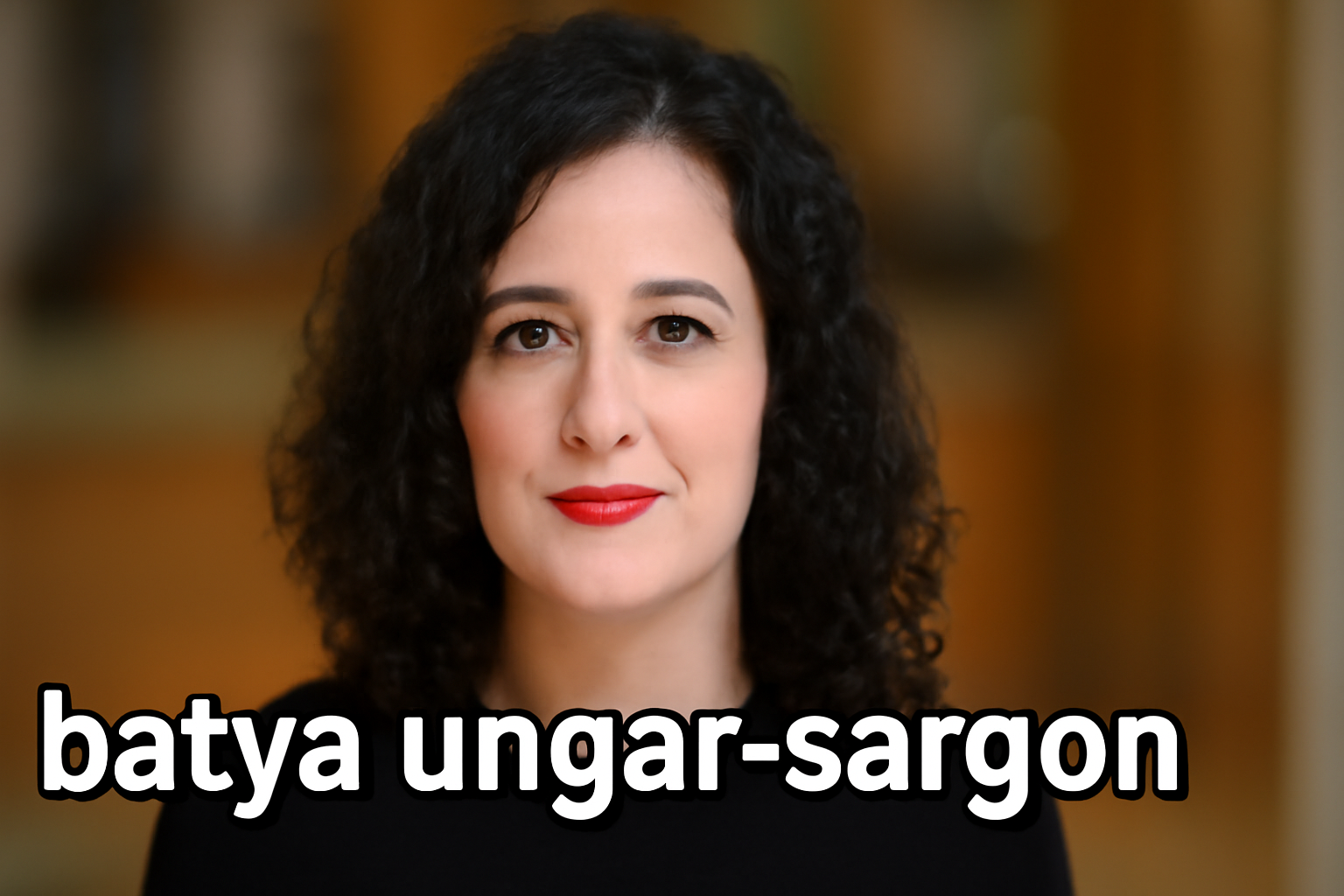Batya Ungar-Sargon: The Provocative Voice Challenging Mainstream Media and Politics

Table of Contents
ToggleIntroduction
Batya Ungar-Sargon is a prominent American journalist, author, and political commentator known for her bold critiques of the media landscape and her unflinching stance on class issues in modern society. With a background in both journalism and academia, she has established herself as a sharp critic of the media’s shift towards “woke” culture and its impact on democracy. Through her work, Ungar-Sargon has become a recognized voice challenging the narratives that shape public discourse, particularly in how the media portrays class, race, and politics. Her rise in media circles is not only a result of her intellectual capacity but also due to her ability to tackle controversial topics head-on.
Quick Bio:
-
Full Name: Batya Ungar-Sargon
-
Date of Birth: 1981
-
Place of Birth: Philadelphia, Pennsylvania, USA
-
Nationality: American
-
Ethnicity: Jewish
-
Education: B.A. in English (University of Chicago), Ph.D. in English (University of California, Berkeley)
-
Career Start: 2012 (Reporting on Hurricane Sandy)
-
Notable Positions: Deputy Opinion Editor at Newsweek, Former Opinion Editor at The Forward
-
Books: Bad News: How Woke Media Is Undermining Democracy (2021), Second Class: How the Elites Betrayed America’s Working Men and Women (2024)
-
Political Views: Left-wing populist, Marxist inclinations
-
Spouse: Married
-
Net Worth: Estimated around $3 million
-
Legacy: Advocate for working-class politics, critic of mainstream media, and identity politics
Early Life and Education
Born in 1981 in Philadelphia, Pennsylvania, Batya Ungar-Sargon grew up in an Orthodox Jewish family in Brookline, Massachusetts. From a young age, she exhibited a keen interest in intellectual pursuits, particularly literature and writing. This led her to pursue higher education with a focus on English and literary studies. She attended the University of Chicago, where she completed her Bachelor of Arts in English in 2004. Driven by her passion for literature and critical theory, Ungar-Sargon continued her academic journey at the University of California, Berkeley, earning a Ph.D. in English in 2013. Her dissertation, titled “Coercive Pleasures: The Force and Form of the Novel 1719–1740”, examined the intersections of colonialism, power dynamics, and narrative structures in early English novels.
Her academic background in critical theory and literature helped shape her later career as a journalist and author, where she continued to explore themes of power, class, and societal structures.
Career Beginnings and Media Involvement
Ungar-Sargon’s journalism career began after her academic journey, where she initially worked as a reporter documenting the aftermath of Hurricane Sandy in 2012. This experience exposed her to the realities of urban inequality and sparked her interest in issues of class, politics, and social justice. She began contributing to outlets like City Limits, where she reported on tenant rights, urban poverty, and immigrant communities.
In 2017, she joined The Forward, a prominent Jewish publication, as its opinion editor. During her tenure, Ungar-Sargon became known for her unapologetic stance on various political and social issues, often challenging the prevailing progressive narratives in the media. Her work attracted both praise and criticism, particularly for her critiques of identity politics and her call for a more inclusive, working-class focused approach to political discourse.
By 2021, Ungar-Sargon made the move to Newsweek, where she currently serves as the deputy opinion editor. This position has given her a broader platform to voice her critiques of mainstream media practices, particularly its shift towards race-conscious coverage at the expense of addressing class-based issues. Her writing on this shift culminated in her bestselling book, Bad News: How Woke Media Is Undermining Democracy.
Publications and Impact
Batya Ungar-Sargon’s book Bad News (2021) serves as a cornerstone of her criticism of contemporary media. In this book, she argues that mainstream media has increasingly catered to an affluent, educated, urban elite while sidelining the concerns of working-class Americans. She claims that this shift from class-based reporting to race-based coverage has undermined democratic norms and alienated large swaths of the population.
Following the success of Bad News, Ungar-Sargon published another book in 2024 titled Second Class: How the Elites Betrayed America’s Working Men and Women. In this work, she delves deeper into the social and political disconnect between the American elite and working-class Americans, calling attention to how policies and media portrayals have systematically marginalized the working class. The book underscores her belief in the need for a class-conscious approach to politics and media reporting.
Political Views and Stance
Batya Ungar-Sargon’s political views have evolved over time, particularly as she has distanced herself from traditional liberal ideologies. In the 2020s, she became increasingly critical of what she saw as the left’s growing focus on identity politics and “woke” culture. Her critiques of the media’s role in fostering these movements have led some to label her a populist, while others, including Bari Weiss, have characterized her as a left-wing populist. In interviews, she has even described herself as a Marxist, emphasizing her focus on class struggle over racial or identity-based divides.
Ungar-Sargon is also a staunch critic of the current immigration policies in the United States, advocating for limitations on immigration and a more cautious approach to foreign policy. She has questioned the rationale behind U.S. support for Ukraine, arguing that American resources should instead be focused on addressing domestic issues.
Personal Life and Family
Batya Ungar-Sargon is married and resides in Brooklyn, New York. Although she maintains a relatively private personal life, her family background, particularly her upbringing in an Orthodox Jewish household, has influenced her perspectives on community, tradition, and societal values. She is the daughter of Julian Ungar-Sargon, a neurologist, and comes from a family with deep intellectual and cultural roots.
Her educational and familial influences have shaped her worldview, particularly her belief in the importance of education, intellectual curiosity, and critical thinking in addressing societal issues. Despite the pressures of her professional life, Ungar-Sargon remains deeply committed to her family and community.
Legacy and Influence
Batya Ungar-Sargon has left an indelible mark on the discourse surrounding media, politics, and social justice. Through her books, articles, and public commentary, she has encouraged a re-examination of how mainstream media covers social issues, urging greater attention to the working class. Her influence extends beyond journalism into broader political thought, particularly in her call for a more inclusive, class-based political agenda.
Her legacy is that of a thought leader who has fearlessly taken on powerful institutions in the media and politics, challenging their narratives and urging society to consider the voices of those traditionally left behind. Whether one agrees with her perspectives or not, Ungar-Sargon has undoubtedly shaped the conversation around media responsibility and the future of democratic engagement.
Conclusion
Batya Ungar-Sargon’s work in journalism, her publications, and her evolving political views have established her as a formidable voice in contemporary discourse. She has dedicated herself to challenging the prevailing narratives in mainstream media, advocating for a media landscape that acknowledges the concerns of working-class Americans. Her critiques of identity politics, the mainstream media’s priorities, and its impact on democracy continue to resonate with a wide audience.
FAQ
Q: What is Batya Ungar-Sargon known for?
Batya Ungar-Sargon is known for her critical perspectives on the media, especially its shift from class-based reporting to race-conscious coverage. She is also the author of Bad News and Second Class.
Q: What are Batya Ungar-Sargon’s political views?
Batya Ungar-Sargon is a left-wing populist with a Marxist inclination. She is critical of identity politics and advocates for policies that prioritize the working class.
Q: What is Batya Ungar-Sargon’s latest book about?
Her latest book, Second Class: How the Elites Betrayed America’s Working Men and Women, explores the disconnect between the American elite and working-class Americans, focusing on how policies and media portrayals have marginalized the working class.
Q: Where does Batya Ungar-Sargon live?
Batya Ungar-Sargon lives in Brooklyn, New York, with her family.




